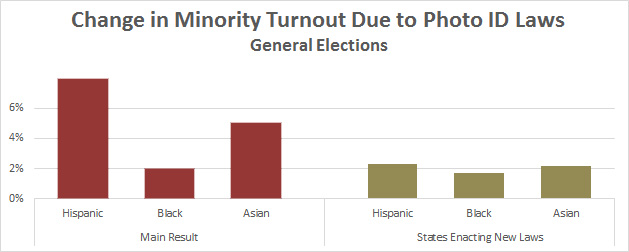Do photo ID laws reduce minority turnout? Previous studies have suggested that the answer is yes, but the effect is fairly small. However, in the Washington Post last week, three scholars wrote about a new study they conducted, which offers “a more definitive assessment” than previous studies. Their conclusion: states with strict photo ID laws produce a far lower turnout among minorities than other states.
It’s taken me a while to comment on this because I had to read the report a few times to make sure I understood everything. In the end, I found several reasons to be skeptical of their conclusion.
First off, they found much stronger effects in primaries than in general elections. Now, maybe this really is the case, and I can certainly invent plausible stories about why it might be so. But it still seems odd.
Second, in a draft version of their study, they say this:
Importantly, we see no effects for Asian Americans, the one minority group that is, by at least some standards, not socioeconomically disadvantaged. The effects of these laws seem to be concentrated toward the bottom end of the racial hierarchy.
In later drafts, their numbers have been updated and it turns out that Asian Americans are affected by voter ID laws—which makes their important finding disappear. But if this was an important verification in one draft, it ought to be an important discrepancy in the final draft. However, it’s not mentioned.
Third, hardly any of their findings are statistically significant. I’m not a big stickler for 95 percent significance always and everywhere, especially for something like this, where there’s one messy set of real-life data and you have to draw conclusions from it one way or another. If the results are significant at 85 or 90 percent, that’s still strongly suggestive. Nonetheless, that’s all it is.
Fourth, the effect size on African Americans is considerably less than it is for Hispanics and Asian Americans. Maybe this is just because blacks are more politically organized, and therefore more likely to overcome the deterrent effects of photo ID laws. Maybe.
So far, none of these are deal breakers. They made me a little tentative about accepting the authors’ results, but that’s all. But then we get this:

Here’s what’s going on. On the left, you see their main results, based on a model they constructed. It shows very large effects: in states with strict photo ID laws, turnout decreases 8 percentage points among Hispanics, 2 percent among African Americans, and 5 percent among Asians.
On the right, you see the results from a second test. It compares turnout in states before and after they enacted strict photo ID laws, and it shows much smaller effects: about 2 percentage points for all minorities. This strikes me as a better test, since it eliminates lots of confounding variables that crop up when you compare one set of states to a different set. But the authors go to considerable lengths to downplay these results, for reasons that I don’t find very persuasive. Yes, their sample size is smaller, and yes, things can change from year to year. But their sample sizes aren’t that small, and the differences in a single state over the course of two years is probably smaller than the differences between states in the same year.
Maybe I’m totally off base here. I don’t have the raw data or the chops to analyze it. Still, if I had to bet money, I’d bet that the second test is more reliable, and the real effect of photo ID laws is a decreased turnout of about 2 percentage points among minorities. That’s plenty to affect a close election, and the motivation for these laws is plainly partisan and racial. They should be done away with everywhere.
That said, I continue to suspect that the effect is fairly modest.
















